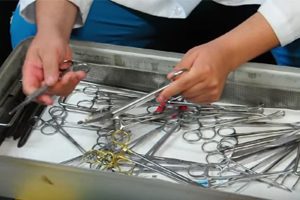
Patients Are Unaware Of The Increasing Reused Surgical Devices. Recently, several news services reported that patients undergoing medical or surgical procedures are generally unaware of the increasing use of reconditioned medical devices. A particularly enlightening article appeared in the Washington Post (12/11/05) that revealed how the practice of reusing so-called one-time-use medical devices is becoming more […]

Patients Are Unaware Of The Increasing Reused Surgical Devices. Recently, several news services reported that patients undergoing medical or surgical procedures are generally unaware of the increasing use of reconditioned medical devices.
A particularly enlightening article appeared in the Washington Post (12/11/05) that revealed how the practice of reusing so-called one-time-use medical devices is becoming more widely accepted at hospitals across the country.
Unlike consumer products, however, medical devices are often used internally and require a much higher degree of reliability. There are a number of issues that make the practice potentially problematic even though hospitals vouch for their safety and dependability.
As previously reported, some possible areas where difficulties may arise are as follow:
• Hospitals are not required to inform patients that a recondition medical device will be used in a procedure or surgery.
• The reconditioned devices are not guaranteed by the original manufacturer.
• Manufacturers warn against reusing of one-time medical devices and will not vouch for their safety after being reconditioned.
• While hospitals maintain sterilization of reconditioned devices is thorough and even meticulous, the fact that they have been used before makes it impossible to guarantee the same degree of safety as an unused, sterilized, and sealed devices.
• There are numerous reported cases of reconditioned medical devices breaking or malfunctioning during reuse with anywhere from minor to catastrophic consequences.
• One-time –use products are approved under a different standard than multiple-use devices. The one-time-use devices are often opted for by manufacturers because they do not have to be as sturdy and the manufacturer’s exposure to liability will be greatly diminished. One-time-use devices also ensure “a steady stream of replacement orders.
Hospitals see reconditioned medical devices as a significant cost-cutting measure since they regard the one-time-only “designation as a manufacturer’s ploy to force them to buy more devices then they need.” Thus, it is becoming more common for hospitals to ignore warnings against reuse.
Now, however, The Washington Post has published a follow-up article that raises the question of whether the reuse of potentially contaminated surgical devices may be responsible for infecting patients with a rare type of brain disease called Creutzfeldt-Jakob Disease (CJD).
CJD is not a typical bacterium or virus. It is believed to be an abnormal protein, or prion. Moreover, CJD and the other prion-based diseases are difficult to detect and often take several years to manifest themselves. When they do, the symptoms can include dementia or neurological impairment.
As pointed out by The Washington Post: “As a result, when hospitals reuse such devices, medical experts say, there is a small risk that they may be exposing patients to a fatal disease with no known cure. Over the past five years, dozens of patients in at least four U.S. hospitals have been potentially exposed to the disease because their surgeons reused medical instruments first used on patients who had the rare brain disorder, according to documents and interviews.”
As a result of a number of cases involving deaths or potential exposure to CJD or other prion diseases, several hospitals have revised their instrument procedures. In at least one case, a hospital “suspended its neurological surgeries and destroyed all equipment reused in such cases.”
According to the Association of Medical Device Reprocessors, none of its members reconditions invasive devices used in brain surgery. The Centers for Disease Control and Prevention (CDC) recommends using disposable surgical devices for the brain only once. The CDC, however, only makes recommendations, it does not make rules.
The Joint Commission on Accreditation of Healthcare Organizations advises “against reusing instruments in brain biopsy procedures when a patient’s diagnosis is uncertain. But it does not have any requirements about how to handle devices potentially exposed to prion diseases.” (WP)
The Food and Drug Administration (FDA) has yet to impose rules addressing the issue of how “to effectively decontaminate devices potentially contaminated by prions.” (WP) The agency did state in an email, however, that “There are no specific rules/regulations that address this issue presently nor any acceptable decontamination protocols.”
The personal injury attorneys at Parker Waichman LLP offer free, no-obligation case evaluations. For more information, fill out our online contact form or call 1-800-YOURLAWYER (1-800-968-7529).


